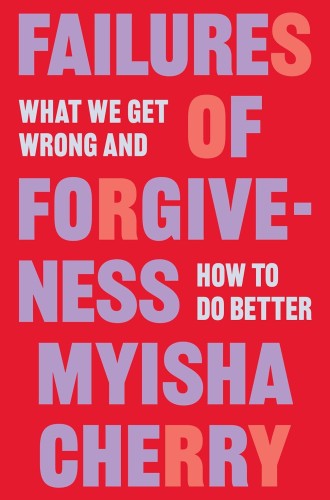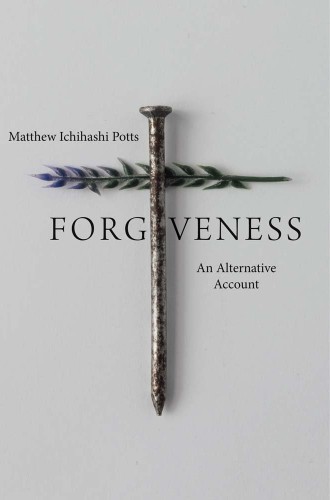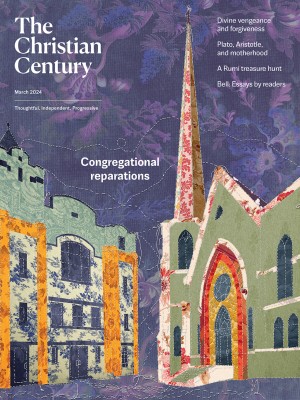What is forgiveness?
Myisha Cherry and Matthew Ichihashi Potts each challenge a new American mythology.
Miroslav Volf once wrote a book attempting to reclaim forgiveness for a “culture stripped of grace.” Nearly 20 years later, two books are renewing that attempt for a situation Volf likely didn’t anticipate: a culture oversaturated with forgiveness.
Philosopher Myisha Cherry and moral theologian Matthew Ichihashi Potts each set out to counter the new American mythology of forgiveness. Corporations regularly promote it, while the media pressures victims to extend it. Forgiveness alone, the message goes, holds the power to save us from our divisions. Both authors find this magic pill too hard to swallow. “Like any powerful medicine,” Cherry explains, forgiveness “works only if it is applied properly.”
Read our latest issue or browse back issues.
To illustrate the misapplication of forgiveness, each author begins in the same place: the 2015 Charleston, South Carolina, church shootings that left nine Black Americans murdered. Several family members of the victims publicly forgave the perpetrator, seemingly unconditionally, not in response to any sign of contrition or repentance. Cherry and Potts both worry about how such acts, while inspiring, are spun within the new mythology. These acts of forgiveness are purported to heal the wound of racism, but have they contributed to dismantling White supremacy? These acts are ascribed moral praise, but does that mean we all have a moral obligation to forgive in the same way? These acts promise to cleanse the conscience, but do we still have moral permission to be angry?
Underneath such questions is a singular concern that animates both authors: victims, especially communities experiencing systemic forms of violence, unjustly suffer under the moral and theological pressure to extend forgiveness. Such demands to harness the so-called power of forgiveness are ultimately rooted in neither the gospel nor our human instincts to repair but in what Potts names as “white Christianity’s squeamishness before the justified righteousness of Black anger in this country.” Both books are timely interventions that attempt to disentangle the meaning and practice of forgiveness from the grasp of White fragility.
Both Cherry and Potts begin by demythologizing the notion that forgiveness is a sure means to achieve a return or restoration to a previous state of harmony. Forgiveness and reconciliation are related yet also distinct and separable acts. One does not always lead to the other. Potts wants to give witness to “the past’s irrevocability, the irrecuperability of its wrongs and wounds.” More practically, Cherry observes that “some things and some relationships, because of the danger they pose, should not be repaired or restored.”
Further, both authors question whether forgiveness necessarily involves a change of affect (although they acknowledge that this may be a feature of a particular act of forgiveness and even a reason why someone seeks to forgive). In dialogue with the Christian tradition, Potts affirms the moral significance of righteous anger. Likewise, Cherry highlights how anger can function as an ally of love by aiming “for the best in our families and world” precisely “by recognizing, judging, and preventing wrongdoing.”
Agreed on the problem, Potts and Cherry diverge in their approach to, if not also the content of, the solution.
Potts uses the word alternative to position forgiveness as a response to wrongdoing that differs from retaliation. His critique of retaliation (and its cousins revenge and retribution) cuts deeper than the fact that they respond to violence with more violence. They also rely upon a kind of mistaken compensatory logic: the belief that our pain will be resolved, our anger mollified, our loss compensated if some kind of punishment is meted out. Against such attempts to restore that which cannot be restored, Potts defines forgiveness, stripped down, as simply the refusal to retaliate. It’s a species of the enemy love commanded by Jesus.
As such, non-retaliation is primarily an action, not a feeling. One can choose to not retaliate and still feel anger, grief, pain, and rage in response to wrongs done. Indeed, once forgiveness is disentangled from any notion of compensation for some outstanding debt (as it functions in so many atonement theories), we are freed to recognize that forgiveness is actually about the acceptance of wrongdoing.
This is where Potts’s use of alternative proves most novel. Understanding forgiveness as a genre of reconciliation, he argues, is a category mistake; forgiveness should be cataloged as a form of mourning. Rather than letting our anger and grief over wrongdoing get buried under the passion of vengeance or well-intentioned desires to forgive and forget, precisely by refusing to retaliate, forgiveness is an act whereby we keep the wrongs uncovered, grieve them, and then face the complex task of moving forward in relationships “slowly, painfully, even perhaps like Christ with permanently open wounds.” Potts fleshes out this forward movement through decidedly non-triumphalist, one might even say tragic, accounts of repentance, remission, and resurrection. In Potts’s hands, each of these instances is a spiritual practice of honestly accepting, coping with, and courageously charting a loving way forward in a world marked by wrong, where there are no morally pure agents, and the pain of loss is never erased.
Potts’s book also distinguishes itself as an alternative to similar theological and philosophical accounts of forgiveness—with which he is in frequent and often exhilarating conversation—by functioning as a work of literary interpretation. Brilliant analyses of the novels of Kazuo Ishiguro, Marilynne Robinson, Louise Erdrich, and Toni Morrison are the fulcrum of each chapter. The medium is the message here. For Potts, life is no comedy with easy rules that lead to happy endings. Forgiveness is about how “a habit of loving restraint” can interrupt the all-too-normal cycles of violence and imagine new ways forward in irreducibly complex situations. Such possibilities cannot be prescribed as much as creatively depicted through the arts, through poetry and story. Thus, Potts ends with a moving scene from the Iliad in which shared grief momentarily interrupts vengeance, a portrait meant to inspire us to find our own ways to actualize grace in our tragic world.
Potts’s interdisciplinary genius, however, is also his limitation. He starts his meditation in the very real dynamics of Charleston but then transitions to literary worlds from which he never emerges.
While Potts’s book should be considered required reading for all graduate students studying the concept of forgiveness, Cherry’s book, rooted in real-world examples, is what I would hand to my congregant struggling over whether to forgive a family member. Cherry’s task is not to replace as much as broaden our preconceived notions of forgiveness. Her approach is thoroughly pragmatic: forgiveness is a human social practice, and so she sets out to make explicit the norms governing it.
This first requires clarity about the variety of agents, aims, and types of actions at play in any potential act of forgiveness, which is the focus of her first several chapters. There are victims and wrongdoers, those with the right to forgive and those who are its recipients. One may aim for relief, release, or reconciliation. There is also a range of possible actions, from the affective act of moderating one’s resentment, to the performative utterance of forgiveness, to the cognitive act of seeing someone in a new light, to various other behavioral, relational, and ritualistic actions. Depending on which aim, who is targeted, and what type of action you select, forgiveness may take very different forms—options which Cherry at times catalogs in a kind of forgiveness menu. Her point is that “a person needn’t do one specific practice, or engage in them all, in order to forgive.” Like basketball, she says, there’s more than one way to play.
If Cherry’s contribution is to expand our moral playbook when it comes to the practice of forgiveness, perhaps the most fascinating play call she offers us is the option to withhold it. Rather than viewing withholders as moral failures, she defends their moral courage. Pursuing certain reparative aims might provide good reason to refrain from forgiving. One might seek relief from the pain of wrongdoing by acts of self-care or by setting firm boundaries with the offender. Instead of shaming or pressuring victims who make such choices, Cherry affirms their moral agency and integrity.
It should be noted that Cherry situates her book outside of the Christian tradition, making no appeals to Jesus or the nature of God. The closest she comes to providing a reason for forgiveness is an appeal to evolutionary biology: we are “a species equipped with a reparative instinct.” While this is our foundational drive, basic to our survival, our instinct to forgive is just one manifestation of it, one available tool. “We forgive for reparative reasons,” but such reasons might also compel us not to forgive or to invest our moral energy otherwise. What truly matters is the work of repair.
Before one judges this humanistic perspective theologically insufficient, note that it affords her the vantage from which to charitably criticize South Africa’s Truth and Reconciliation Commission, which is so often invoked as the shining example of forgiveness’s power to heal. Cherry carefully delineates how the public invocation of Jesus’ unconditional forgiveness alienated as much as inspired, rendering it less effective for a political and social project of reconciliation than Christians like to believe. In our time of continual international conflicts, we might receive this criticism as an invitation to step down from our moral soapboxes.
Indeed, how and when to practice forgiveness is always a matter of context for Cherry. It requires discerning which actions fit the situation. The latter half of her book mainly explores how to apply the forgiveness playbook in different contexts, attending in turn to racialized social divisions, family systems, the workplace, online culture, and, finally, the person we see in the mirror. For those who may be intimidated—or confused—by Potts’s call to poetically embody loving restraint, Cherry extends a largely complementary practical handbook. She provides concrete language, potential strategies, and contextual self-awareness to the practice of forgiveness, all without short-circuiting an individual’s need to exercise creative moral discernment of their own.
Readers may wonder: Do Potts’s tragic realism and Cherry’s pragmatic menu dull the sharp edge of Christian forgiveness? Do they make forgiveness too complicated? Volf, like the apostle Paul, made a simpler appeal: God forgave in Christ, so you should forgive one another.
Yet, even for those who take that basic theological ethic for granted, Potts and Cherry issue a challenge. In a world marked by colonial and racialized violence, just as with the practice of evangelism, we simply can no longer take the meaning and expression of forgiveness for granted. An uncritical account of forgiveness is no longer morally responsible. So, yes, we should forgive like Christ, but how can we do so with contextually appropriate care, clarity, and creativity? That question is the gift and task these books leave us with.







